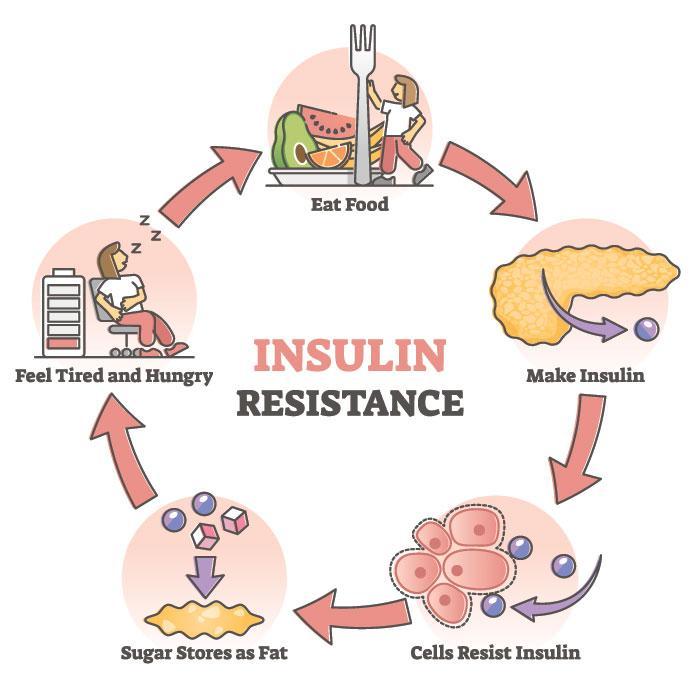Four in ten adults have insulin resistance. This resistance puts you at increased risk of further health complications, such as diabetes. Exercise and other lifestyle changes can help, but not all causes are reversible.
If you’ve been told that you need to make changes due to insulin resistance, but it’s not working, there are other options. Hormone therapy for insulin resistance could help your body better respond to insulin.
Are you ready to take control of your health? Keep reading to learn more about hormone therapy and insulin resistance.
What Is Insulin Resistance?
Insulin resistance is a condition that affects the body’s ability to use insulin properly. This is a peptide produced by the pancreas.
Normally, insulin helps regulate blood sugar levels. It does this by allowing cells to absorb glucose from the bloodstream. In cases of insulin resistance, cells become less responsive to signals from insulin.
This can lead to elevated blood sugar levels. It can then potentially progress into type 2 diabetes if left untreated.
Insulin resistance often occurs as part of metabolic syndrome. This includes other risk factors such as obesity and high blood pressure.

What Causes Insulin Resistance?
Insulin resistance is a complex metabolic condition that can have various causes. While you can address some of these causes through lifestyle changes, other causes are not as easy to address.
Understanding the underlying causes is crucial. It can help with developing effective strategies for managing and treating insulin resistance. There are a couple of ways you can address these causes.
- Lifestyle modifications
- Targeted therapies
Using these methods, you can regain control over your blood sugar and your life.
Excess Body Weight
One of the primary culprits behind insulin resistance is excess body weight. This is particularly true when it accumulates around the abdomen.
This visceral fat releases chemicals called adipokines. These chemicals interfere with insulin’s ability to regulate blood sugar levels.
Sedentary Lifestyle
Another major factor in causing insulin resistance is a sedentary lifestyle. Lack of physical activity can lead to decreased muscle mass and increased fat deposition. Both of those contribute to impaired glucose metabolism.
Genetics
Genetics also play a role in determining one’s susceptibility to developing insulin resistance. Certain genetic variants can affect how cells respond to insulin. This makes them less efficient at utilizing glucose for energy.
Chronic Inflammation
Chronic inflammation is another underlying cause of insulin resistance. Inflammation disrupts normal cellular signaling pathways. This impairs the function of key molecules involved in glucose regulation.
Hormonal Imbalances
Hormonal imbalances can contribute. This includes conditions like polycystic ovary syndrome (PCOS) or overproduction of stress hormones like cortisol.
There are a variety of treatments for hormonal imbalances that can help to reduce insulin resistance. Treatments may include the following:
- Lifestyle changes such as diet and exercise
- Medications
- Hormone therapy
What Are the Dangers of Insulin Resistance?
Insulin resistance can have serious health implications if left untreated. Here are some of the dangers associated with insulin resistance:
- Type 2 Diabetes
- Cardiovascular Disease
- Weight Gain and Obesity
- Polycystic Ovary Syndrome (PCOS)
- Non-Alcoholic Fatty Liver Disease (NAFLD)
- Sleep Apnea
- Cognitive Decline
What Are the Symptoms of Insulin Resistance?
The symptoms of insulin resistance can vary from person to person. Some individuals may not experience any noticeable symptoms at all. However, others may have more pronounced signs.
It’s important to note that these symptoms are not exclusive indicators of insulin resistance. They can overlap with other conditions or health issues.
If you suspect you have insulin resistance, consult a doctor for proper diagnosis and treatment options.
Fatigue
One common symptom is fatigue or feeling tired even after getting enough rest. This can be due to the body’s inability to utilize glucose for energy effectively.
Weight Gain or Difficulty Losing Weight
Weight gain and difficulty losing weight are also commonly associated with insulin resistance. The excess glucose in the bloodstream gets stored as fat rather than being used for energy. This leads to unwanted weight gain.
Increased Hunger or Cravings for Sugary Foods
Another symptom is increased hunger or cravings for sugary foods. This occurs because the body is not efficiently using insulin to regulate blood sugar levels. It can cause your body to send signals for more food intake.
Other Potential Symptoms
While the symptoms above may seem like enough, they’re not the only ones. Other potential symptoms include the following:
- Frequent urination, especially during the night (nocturia)
- Increased thirst and dry mouth (polydipsia)
- Blurred vision
What’s the Difference Between Diabetes and Insulin Resistance?
When it comes to understanding insulin resistance, it’s important to differentiate it from diabetes. While they are related, they are not the same thing.
Insulin resistance is a condition where the body’s cells become resistant to insulin. This results in higher levels of glucose (sugar) in the bloodstream.
It is considered a precursor to type 2 diabetes. It can increase the risk of developing this chronic disease if left untreated.
Diabetes, on the other hand, is a medical condition characterized by high blood sugar levels. There are two main types of diabetes: type 1 and type 2.
Type 1 diabetes occurs when the pancreas fails to produce enough insulin. Type 2 diabetes occurs when there is a combination of insulin resistance and inadequate insulin production.
In simple terms, insulin resistance is an underlying factor that can lead to type 2 diabetes. Not everyone with insulin resistance will develop diabetes. However, individuals with this condition are more likely to develop it if proper measures aren’t taken.
Understanding this distinction between insulin resistance and diabetes is crucial. This can help with effective management and treatment strategies. By addressing insulin resistance early on, you may be able to prevent or delay the onset of full-blown diabetes.
HRT and Insulin Resistance: The Role of Hormones

In recent years hormone therapy has emerged as a potential treatment option. Hormone therapy specifically targeted toward rebalancing hormonal imbalances in the body can play a crucial role in helping manage insulin resistance.
Let’s talk about the different hormones that play a role in insulin resistance.
Estrogen
One of the primary hormones involved in insulin regulation is estrogen. Estrogen deficiency or imbalance can interfere with the body’s ability to use glucose effectively. This can lead to insulin resistance.
HRT can help to restore optimal estrogen levels. Because of this, it’s possible to see improvements in insulin sensitivity and glucose metabolism.
Progesterone
Progesterone is another hormone that plays a significant role in regulating blood sugar levels. Imbalances or deficiencies in progesterone can contribute to insulin resistance. Progesterone supplementation may help address these imbalances and improve overall metabolic function.
Testosterone
Testosterone also plays an important role in maintaining healthy glucose metabolism. Low testosterone levels are associated with an increased risk of diabetes and insulin resistance.
Hormone therapy aimed at restoring testosterone levels within a normal range may enhance insulin sensitivity. It may also reduce the risk of complications related to inadequate glucose control.
The Benefits of Using Hormone Therapy for Insulin Resistance
When it comes to treating insulin resistance, hormone therapy can play a crucial role. Let’s talk about some of the big benefits of choosing to go this route.
Regulate Hormonal Imbalances
One key benefit of hormone therapy is its ability to regulate hormonal imbalances. These imbalances can contribute to insulin resistance. This can lead to improved insulin sensitivity and better control over blood sugar levels.
Reduce Inflammation
Another benefit is the potential to reduce inflammation. Insulin resistance often goes hand-in-hand with chronic low-grade inflammation. This can further worsen metabolic dysfunction.
Hormone therapy aims to alleviate this inflammation. This helps to promote healthier functioning of cells and tissues throughout the body.
Address the Root of the Problem
Hormone therapy also offers the advantage of addressing underlying causes of insulin resistance. For example, women experiencing menopause may have decreased estrogen levels. This can increase their risk of developing insulin resistance.
Hormone therapy can help replace or replenish these hormones. This can lead to improved glucose metabolism and reduced risk of diabetes.
Improve Cardiovascular Health
Studies have shown that hormone replacement therapies like HRT can enhance cardiovascular health. Recent studies have shown it to be especially beneficial in menopausal women.
Who Is a Good Candidate for Hormone Therapy for Insulin Resistance?
Certain individuals may be good candidates for this type of treatment.
It’s always important to consult with a healthcare professional to determine the best course of action for your specific situation. However, let’s discuss some factors that might indicate you could benefit from hormone therapy.
Diagnosis of Insulin Resistance
HRT could be an option worth considering if you have been diagnosed with insulin resistance and have not seen improvements through lifestyle changes alone. This is especially true if you have tried other treatments and haven’t achieved the desired results.
Women in Menopause or Perimenopause
Women experiencing menopause or perimenopause may find hormone therapy helpful in managing their insulin resistance. Hormone imbalances during these life stages can exacerbate insulin resistance symptoms. This makes it more difficult to control blood sugar levels.
Family History
Individuals who have a family history of diabetes or other hormonal disorders may also be good candidates for HRT as a preventive measure. By addressing any underlying hormonal imbalances early on, it may be possible to reduce the risk of developing insulin resistance or diabetes later in life.
Who Isn’t a Good Candidate for Hormone Therapy for Insulin Resistance?
While hormone therapy can be beneficial for many individuals with insulin resistance, it may not be suitable for everyone. There are certain risk factors that can make it a bad choice.
Some of these risk factors include the following:
- History of blood clots
- Liver disease
- Breast cancer
- Certain types of heart disease
- Anyone pregnant or planning to become pregnant
How Can You Get Started Treating Insulin Resistance With Hormone Therapy?
Are you ready to get started with hormone therapy? This is a decision that should be discussed with your healthcare provider.
Since everyone’s medical history and needs are unique, it’s important to have a personalized approach.
Schedule an Appointment
The first step is to schedule an appointment with your doctor or endocrinologist who specializes in hormone therapy. They will take the following steps:
- Assess your overall health
- Review any existing conditions you have
- Conduct necessary tests
This will help determine if hormone therapy is the right option.
Create a Treatment Plan
After it has been determined hormone therapy is appropriate, you’ll work with your doctor to create a treatment plan. This may involve prescribing medications or hormones such as estrogen or testosterone.
Stick to the Plan
Once you’ve created a treatment plan, it’s important to follow it. You’ll need to attend regular check-ups to monitor your progress. This will also help you make any needed adjustments with your doctor.
When using HRT for insulin resistance, working closely with your doctor is necessary.
Combine HRT With Lifestyle Changes
Lifestyle modifications are crucial in managing insulin resistance. These can include the following:
- Adopting a healthy diet rich in whole foods
- Engaging in regular physical activity
- Getting enough sleep
- Managing stress levels effectively,
- Avoiding smoking and excessive alcohol consumption
Take Control of Your Health With Hormone Therapy for Insulin Resistance
Insulin resistance can have a significant impact on your health. Ultimately, it puts you at risk of developing more serious conditions the longer it is left unaddressed. However, treatments like hormone therapy for insulin resistance can help.
Are you ready to find out if it’s the right solution for you? Book an appointment to get started with online hormone therapy today.















13 Responses
Keep up the excellent work, I read few blog posts on this website and I believe that your web blog is rattling interesting and has got bands of wonderful info .
I find it surprising that hormone therapy makes it easier to handle weight loss and symptoms of hormonal imbalance. My colleague is planning to help his uncle in becoming fit again. I will talk to him about finding a wellness center that offers these services someday.
Great wordpress blog here.. It’s hard to find quality writing like yours these days. I really appreciate people like you! take care
What i do not understood is in truth how you are not actually a lot more smartlyliked than you may be now You are very intelligent You realize therefore significantly in the case of this topic produced me individually imagine it from numerous numerous angles Its like men and women dont seem to be fascinated until it is one thing to do with Woman gaga Your own stuffs nice All the time care for it up
Major thankies for the article post.Really thank you! Really Great.
Nice post. I learn something totally new and challenging on websites
Wow superb blog layout How long have you been blogging for you make blogging look easy The overall look of your site is magnificent as well as the content
Your writing is not only informative but also incredibly inspiring. You have a knack for sparking curiosity and encouraging critical thinking. Thank you for being such a positive influence!
Wonderful web site Lots of useful info here Im sending it to a few friends ans additionally sharing in delicious And obviously thanks to your effort
Its like you read my mind You appear to know a lot about this like you wrote the book in it or something I think that you could do with some pics to drive the message home a little bit but instead of that this is fantastic blog An excellent read I will certainly be back
Hey, I think your blog might be having browser compatibility issues.
When I look at your blog in Chrome, it looks fine but when opening in Internet Explorer,
it has some overlapping. I just wanted to give you a quick heads up!
Other then that, terrific blog!
Thank you for the auspicious writeup It in fact was a amusement account it Look advanced to more added agreeable from you By the way how could we communicate
Normally I do not read article on blogs however I would like to say that this writeup very forced me to try and do so Your writing style has been amazed me Thanks quite great post